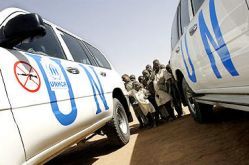Africans back UN intervention for serious abuses
By Jim Lobe
WASHINGTON, Jun 29, 2005 (IPS) — Africans strongly support military intervention authorised by the United Nations Security Council to stop serious abuses of human rights in their region, according to a just-released survey which also found that they prefer U.N. forces to those of the African Union (AU).

|
|
Internally displaced children between United Nations cars in Kalma camp near Nyala town in Sudan’s southern Darfur region, January 2005. (AFP). |
The survey of nearly 11,000 Africans from eight countries — Angola, Cameroon, Ghana, Kenya, Nigeria, South Africa, Tanzania, and Zimbabwe — found that about two-thirds of respondents agreed that the U.N. should have the right to intervene in such cases and that just over half agreed that intervention was justified even without the Security Council’s authorisation.
The surveys, which were conducted by Globescan between late last year, were released here Wednesday along with a the results of a new poll of U.S. public opinion by the University of Maryland’s Programme on International Policy Attitudes (PIPA) that also found continuing majority support for U.N. military intervention in Darfur, Sudan.
The U.S. poll, which was conducted just last week, found that 61 percent of respondents said U.N. members should “step in with military force to stop the violence in Darfur” and that 54 percent said the United States should be willing to contribute troops to such an operation.
A higher percentage — nearly three quarters — of U.S. respondents said they thought NATO, including the U.S., should contribute equipment and logistical support to the current AU monitoring operation in Darfur, Sudan, where as many as 400,000 have died as a result of a two-year-old counterinsurgency campaign against the region’s African inhabitants that the Bush administration has called “genocide.”
“What is quite striking here is that even as the U.S. is tied down in Iraq and suffering daily casualties, a majority of Americans would support contributing troops to a multilateral operation in Darfur,” said Steven Kull, PIPA’s executive director. “This suggests that what is occurring there goes against strongly held values in the American public.”
“Indeed, multiple polls have now found that many Americans believe that if severe human rights abuses are occurring, especially genocide, the U.N. should have the right to intervene and the U.S. should be willing to contribute troops,” he added.
The belief that military intervention for humanitarian purposes should trump concerns about national sovereignty in cases of serious abuses of human rights is apparently shared by most Africans, according to the Globescan surveys which, however, found a significant divergence of opinion among citizens of specific individuals.
Support for U.N.-authorised intervention was strongest in Ghana (80 percent), Kenya (75 percent), Nigeria and Tanzania (66 percent), Zimbabwe (65 percent), and Cameroon (64 percent). In Angola, support for U.N. intervention was 55 percent, while in South Africa a plurality of 47 percent of respondents took the same view.
Overall, only 19 percent of respondents opposed U.N.-authorised intervention, although opposition was almost twice as high in Angola, at 37 percent, according to the Globescan survey.
Asked a choice of actors to intervene in conflicts “like Darfur,” 30 percent of the African respondents said they preferred U.N. peacekeeping operations, while 22 percent opted for an AU force. Only five percent said they would prefer the intervention of a “rich” non-African nation, and seven percent they would support all three options.
The U.N. was most preferred by Ghana, home of U.N. Secretary-General Kofi Annan, Kenya and Zimbabwe, while it was least preferred by South African respondents a plurality of whom nonetheless favoured U.N. intervention over any of the alternatives.
“Clearly, Africans are looking outside their own countries and especially to the United Nations to help deal with some of their problems,” said Globescan’s Lloyd Hetherington. “Contrary to their leaders, it appears that they would like to see the U.N. intervene in dealing with problems such as the crisis in Darfur, with a growing confidence in the African Union to also take on this role.”
Thirteen percent of African respondents said they either opposed any foreign military intervention (11 percent) or no intervention at all (2 percent), while 24 percent expressed no opinion. The greatest number of people rejecting any foreign military option were found in the one Francophone country, Cameroon.
The preference for the United Nations, according to a Globescan analysis, reflected a broader confidence in the world body despite its mixed record in Africa in recent years. Overall, 69 percent of Africans polled said they have a lot or some trust in the U.N. to operate in the best interests of their society.
This was slightly higher than their confidence in the AU (63 percent), their national governments (59 percent), local governments (51 percent), and tribal councils (45 percent).
Just over one-third of Africans interviewed by Globescan said they had heard or read a great deal or a fair amount about the Darfur conflict, according to the report.
When compared with other recent polls on Darfur, the latest U.S. survey showed that public attitudes are affected by whether or not the violence amounts to genocide.
Last December, when PIPA informed respondents that Bush himself had labeled the violence in Darfur a “genocide,” 75 percent of respondents said the U.N. should intervene with military force, and 60 percent said the U.S. should contribute troops.
But when PIPA last week presented the situation more equivocally as “large-scale violence in Darfur àthat some, including the Bush administration have called genocide,” support for U.N. intervention was 13 percent lower and support for U.S. troops contributions 6 points lower.
